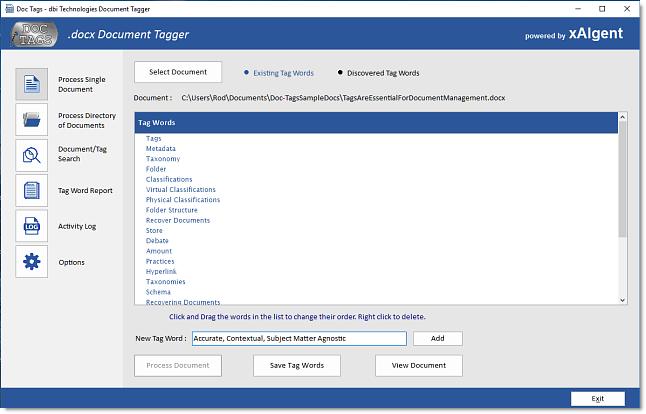Stop Searching and Start Finding |
Searching for Specific Content is a
Time-Wasting, non-Productive activity. Do you find
yourself spending a ridiculous amount of time searching
your digital stores for saved nuggets of reference
material, business reports, market research,
go-to-market strategy detail...? STOP searching and
START Finding!
File systems integrated into computer operating systems
today are good for helping us find content. But those
file systems (file search) are only as good as how our
content has been described in the save process. What
descriptive terms do you use for naming the file that is
being saved? Descriptive file names are one helpful
strategy to keep in mind. Another strategy to employ for
contextually relevant content retrieval is to add
descriptive tags to the content profile during the save
process.
You might be asking, what are descriptive tags and how
do they make a difference?
Tags are descriptive keyphrases that describe, in point
form, what a document is about. These descriptive
keyphrases (tags) are added to the profile of the
content you are saving. For example, you have come
across some industry specific information that you know
will help down the road as you migrate your start-up
from bootstrap to seed round. You just read the article
and are going to save it for later reference - while you
are in the save mode add a few keyphrases that stuck out
for you from the article and place those keyphrases in
the Tags property of the file. Like this...

When you go to find for the content later, the first
thing the O/S file system looks for are the Tags related
to each file. If there are no tags, then the file system
looks to the file name and then on to just a word
search. Tags are the definitive differentiator when it
comes to Finding Knowledgeable content. Help your own
document management be the best it can be by adding
Contextually Relevant, Topical content Tags while you
are saving important information.

Now you are saying, great thanks for this but I have a
bucket load of valuable information already saved - I am
not going to go back and re-read each document, note the
keyphrases, add the keyphrases to each file's Tag
property and then re-save each document!
How can I improve what has already been saved and make
that collection of content truly Findable?
Download and take Doc-Tags for a ride! (Doc-Tags.com)
Doc-Tags will walk through your document directory(ies),
work through each file, extract the Contextually
Accurate and Relevant keyphrases and then place those
key phrases into the document Tags property and then
save a copy of the Tagged file so as not to alter it's
originality. All done automatically. Now, within just a
few minutes you have a fully tagged suite of valuable
information ready for Contextually Accurate and subject
Relevant retrieval. START Finding your valuable
information today!
Want to build your own custom Content Tagging solution?
Or, Super Charge Search Enging Optimization (SEO)
Metadata Tagging? Start here...
API
|
| |
|
|
 |
| |
|
|
| |
|
|
 |
|
|
| |
| Today is the last day you
read / re-read a document to define it for an Enterprise
Content Management System or to publish content on the
Semantic Web |
| |
| |
|
|
| |
 |
|
|
|
|
|
| |
|
|
|
Feature
Highlights:
|
|
| |
• Automatically Create Contextually Accurate Tags
for a Document
|
| |
• Automatically Create
Contextually Accurate Tags Document Folder
|
| |
• Automatically Add Document Meta Data Tags
|
| |
• Subject Domain
Agnostic - additional training NOT required
|
| |
• Automatic Processing - supervision is NOT
required
|
| |
• Document Tags are presented by Weighted
Importance
|
| |
• Process Reporting ...
|
| |
• Tags Generated
|
| |
• Documents Processed
|
| |
• Document Location
|
| |
• Examine Comparative Document Tags
|
| |
• Find Documents with 'These' Tags
|
| |
• Multi Language Support ...
|
| |
• English
|
|
• French
|
| |
• German
|
| |
• Japanese
|
| |
• Korean
|
| |
• Spanish
|
| |
• Contextual Key Terms Automatically Extracted for
Each Document
|
| |
|
| |
|
|
 |
| |
|
|
| Turning
content into valuable resources |
|
| |
|
|
| |
|
|
|

